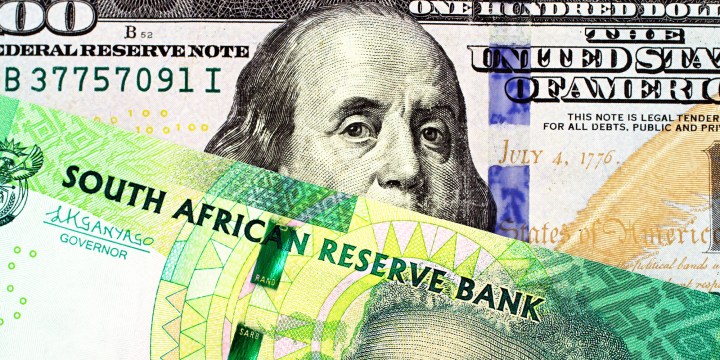BUSINESS MAVERICK
After the Bell: What Phala Phala teaches us about exchange controls

What are we to make of the SA Reserve Bank’s investigation into whether President Cyril Ramaphosa contravened SA’s exchange control regulations in the Phala Phala case? It seems like a bit of a stitch-up, but actually was a pretty hard case, which probably says more about exchange controls than it does about the President’s liability.
SA Reserve Bank Governor Lesetja Kganyago on Wednesday in Parliament defended the central bank’s investigation into the Phala Phala matter, saying the President was not obliged in terms of exchange control regulations to report this transaction. He didn’t have to report it because the $580,000 in cash handed to a lodge manager in 2020 was a “security deposit” and not a final payment.
Now that statement could and perhaps should be met with loud guffaws. The price of a buffalo varies wildly over time and depends on what the animal is going to be used for. Stud buffalo bulls have been sold for enormous sums; a good price these days would probably be about R1-million. But in normal circumstances, a buffalo will set you back somewhere around R200,000. That means the mystery buyer, who is now no longer a mystery, Sudanese businessman Hazim Mustafa, got seriously conned because he put up around R500,000 per buffalo.
And now the Reserve Bank wants us to believe this was just a deposit?! I may not be very experienced in the wild world of buffalo buying, but I do think it’s slightly unusual to pay more than a product is worth as a deposit. But, you know, strange are the ways of the world.
So, although this argument is guffaw-inducing, you do have to acknowledge that the general thrust of the Reserve Bank’s argument is, more or less, logical. The report found that because the sale had not been “perfected”, ie, there was no sale in a real sense, and since there was no sale, Ramaphosa was not required to declare the foreign income. Finish and klaar. For me, the question mark over the report is whether the bank was correct in concluding that the sale had technically not taken place.
After all, if you give an agent the power to transact on your behalf in general terms, and they do so, well then, legally the sale is done and dusted. Furthermore, Ramaphosa has acknowledged that he knew about the supposed sale when the theft of the cash was reported to him after the event. And one thing the Reserve Bank did not say (or at least not as far as we know, because the report is considered to be confidential) is that Ramaphosa reported the transaction. If he had, that would have ended the case right there and the Reserve Bank would not have spent a year investigating it.
For me, the kerfuffle suggests a different question: Why do we still have exchange controls? Nobody ever expressed it in these terms, but SA’s exchange controls were significantly tightened during the latter years of apartheid because the Afrikaner-dominated government was worried the “English” capital was aching to leave the country. The ANC, when it came into power, was worried that “white” capital would rush for the exits.
Actually, both concepts are not only stereotypes, but also, as stereotypes often are, generally false. The reason we know this is because, at various times in SA’s recent history, capital has rushed into the country. Now, sadly, is not one of those times. But they have happened.
Buoyed by this influx, particularly in the late 2000s, exchange controls have gradually been relaxed to the extent that if South Africans want to externalise their entire savings, 99% could legally do so without offending the country’s exchange control regime. In other words, we now have laws in place for the exclusive purpose of constraining 1% of the population. I suppose it is an important 1%.
Because the laws remain on the statute books, the Reserve Bank has to have a huge department monitoring flows into and out of the country. But here’s the weird thing: That SA has exchange controls means there will always be a suspicion on the part of investors that we might need them, so therefore, well, we might need them!
In some ways, I wish the Reserve Bank had found, as it probably should have, that Ramaphosa had contravened exchange control laws, because then it might have thrown up the underlying absurdity of these retrogressive laws. The fact that a country has exchange controls effectively puts a label on its forehead that says, “Beware”. Therefore, people are wary. Exchange controls are the domain of fragile quasi-states, typically with illegitimate governments, afraid of their own populations. (Hello, Russia.)
Unless we want to continue to be seen in that broad category, we should dump them. DM




















 Become an Insider
Become an Insider
I do not understand your point? Cash in your couch from trade does not seem to align in anyway to the constititutional requirenents for trade and tax dues. What this has shown, with support from the Reserve Bank nogal which is gobsmacking, is that if you are wealthy, well connected and powerful you do not have to be constitutional. This issue is thus political.
So hundreds of thousands paid in foreign currency for animals never collected with the cash stuffed in the sofa, and nothing to see. Instead it’s all about the regulatory details! No wonder the media has virtually no credibility.